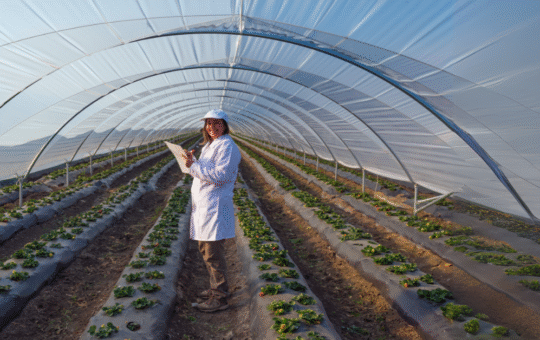
Level 2 Sustainable Agricultural Practices
- Environmental Sustainability: Learn how to incorporate eco-friendly practices into farming, promoting soil health, water conservation, and biodiversity.
- Economic Viability: Understand how sustainable agricultural practices can reduce costs, increase efficiency, and improve farm profitability.
- Compliance with Regulations: Gain knowledge of agricultural regulations and certifications for sustainable farming, ensuring compliance with industry standards.
- Market Competitiveness: Learn how sustainable farming techniques increase market demand for organic and ethically produced food products.
- Career Advancement: Open doors to career opportunities in sustainable agriculture, environmental consulting, organic farming, and farm management.
- Understand Sustainable Farming Principles: Gain knowledge of the principles of sustainable agriculture, including soil health, water management, biodiversity, and climate change mitigation.
- Implement Sustainable Agricultural Practices: Learn how to implement practices such as crop rotation, integrated pest management, organic farming, and conservation tillage.
- Optimize Resource Use: Understand how to manage farm resources efficiently, including water, fertilizers, and energy, while minimizing waste and environmental impact.
- Soil and Water Conservation: Gain techniques for improving soil quality and conserving water to ensure long-term agricultural productivity and environmental health.
- Promote Biodiversity: Learn how to encourage biodiversity on farms, creating healthier ecosystems that support pollinators, natural pest control, and soil fertility.
- Farm Management and Profitability: Develop skills in managing a sustainable farm while maintaining profitability through cost-effective and environmentally friendly practices.
- Introduction to Sustainable Agriculture
- Overview of sustainable agriculture principles and their importance in food production.
- The environmental, social, and economic aspects of sustainable farming.
- Understanding the global challenges of food production and the need for sustainable practices.
- Soil Health and Fertility Management
- Importance of soil health for sustainable farming.
- Techniques for soil fertility management, including composting, cover cropping, and green manures.
- Understanding soil conservation methods such as reduced tillage and erosion control.
- Water Conservation and Management
- Techniques for efficient water use, including drip irrigation, rainwater harvesting, and soil moisture management.
- Understanding water use efficiency and sustainable water management in agriculture.
- Managing irrigation systems to minimize waste and improve crop yields.
- Integrated Pest Management (IPM)
- Principles of integrated pest management (IPM) and its benefits for sustainable agriculture.
- Natural pest control methods and the role of beneficial insects, crop rotation, and biological pest control.
- Reducing dependency on chemical pesticides by implementing environmentally friendly alternatives.
- Crop Rotation and Diversification
- The importance of crop rotation for maintaining soil health and managing pest and disease cycles.
- Benefits of crop diversification for increasing resilience and reducing financial risks.
- Techniques for planning effective crop rotation systems that enhance farm sustainability.
- Organic Farming Techniques
- Introduction to organic farming methods, including certification requirements and market opportunities.
- Understanding organic soil management, pest control, and weed management strategies.
- The benefits and challenges of transitioning to organic farming practices.
- Sustainable Livestock Management
- Principles of sustainable livestock farming, including animal welfare and reducing environmental impact.
- Techniques for improving pasture management, waste recycling, and feed efficiency.
- The role of livestock in maintaining farm biodiversity and sustainability.
- Agroforestry and Biodiversity
- Introduction to agroforestry systems and their role in enhancing farm biodiversity.
- Integrating trees and shrubs with crops to improve soil health, conserve water, and provide wildlife habitats.
- The importance of biodiversity in promoting resilient farming systems.
- Sustainable Farm Manager
- Organic Farming Consultant
- Agricultural Advisor
- Environmental Consultant
- Agricultural Educator
- Sustainability Officer in Agriculture
- Farm Production Planner
- Expert Instructors: Learn from industry professionals with years of practical experience in sustainable agriculture.
- Comprehensive Learning: Gain a solid understanding of all aspects of sustainable farming, from soil health to resource management.
- Real-World Application: Apply your learning to real-world agricultural scenarios, helping to create more sustainable and efficient farming systems.
- Eco-Friendly Focus: Focus on green farming practices that protect the environment while ensuring economic viability.
- Flexible Learning Options: Study in a way that fits your schedule, whether part-time or full-time.
Study Units
- Introduction to Sustainable Agriculture
- Overview of sustainable agriculture principles and their importance in food production.
- The environmental, social, and economic aspects of sustainable farming.
- Understanding the global challenges of food production and the need for sustainable practices.
- Soil Health and Fertility Management
- Importance of soil health for sustainable farming.
- Techniques for soil fertility management, including composting, cover cropping, and green manures.
- Understanding soil conservation methods such as reduced tillage and erosion control.
- Water Conservation and Management
- Techniques for efficient water use, including drip irrigation, rainwater harvesting, and soil moisture management.
- Understanding water use efficiency and sustainable water management in agriculture.
- Managing irrigation systems to minimize waste and improve crop yields.
- Integrated Pest Management (IPM)
- Principles of integrated pest management (IPM) and its benefits for sustainable agriculture.
- Natural pest control methods and the role of beneficial insects, crop rotation, and biological pest control.
- Reducing dependency on chemical pesticides by implementing environmentally friendly alternatives.
- Crop Rotation and Diversification
- The importance of crop rotation for maintaining soil health and managing pest and disease cycles.
- Benefits of crop diversification for increasing resilience and reducing financial risks.
- Techniques for planning effective crop rotation systems that enhance farm sustainability.
- Organic Farming Techniques
- Introduction to organic farming methods, including certification requirements and market opportunities.
- Understanding organic soil management, pest control, and weed management strategies.
- The benefits and challenges of transitioning to organic farming practices.
- Sustainable Livestock Management
- Principles of sustainable livestock farming, including animal welfare and reducing environmental impact.
- Techniques for improving pasture management, waste recycling, and feed efficiency.
- The role of livestock in maintaining farm biodiversity and sustainability.
- Agroforestry and Biodiversity
- Introduction to agroforestry systems and their role in enhancing farm biodiversity.
- Integrating trees and shrubs with crops to improve soil health, conserve water, and provide wildlife habitats.
- The importance of biodiversity in promoting resilient farming systems.
By the end of this course, learners will be able to:
- Understand Sustainable Farming Principles: Gain knowledge of the principles of sustainable agriculture, including soil health, water management, biodiversity, and climate change mitigation.
- Implement Sustainable Agricultural Practices: Learn how to implement practices such as crop rotation, integrated pest management, organic farming, and conservation tillage.
- Optimize Resource Use: Understand how to manage farm resources efficiently, including water, fertilizers, and energy, while minimizing waste and environmental impact.
- Soil and Water Conservation: Gain techniques for improving soil quality and conserving water to ensure long-term agricultural productivity and environmental health.
- Promote Biodiversity: Learn how to encourage biodiversity on farms, creating healthier ecosystems that support pollinators, natural pest control, and soil fertility.
- Farm Management and Profitability: Develop skills in managing a sustainable farm while maintaining profitability through cost-effective and environmentally friendly practices.
The Level 2 Award in Sustainable Agricultural Practices is designed for individuals interested in pursuing a career in sustainable agriculture or improving the sustainability of their current farming practices. This course is ideal for:
Aspiring Sustainable Farm Managers
Individuals looking to manage or operate a farm with an emphasis on environmentally responsible practices, ensuring both profitability and sustainability.
Farmers Transitioning to Sustainable Practices
Farmers who want to enhance the sustainability of their operations by incorporating techniques such as organic farming, water conservation, and biodiversity promotion.
Agricultural Advisors or Consultants
Those interested in providing advice on sustainable agricultural practices and helping farmers implement eco-friendly solutions in their operations.
Environmental Consultants
Professionals wanting to specialize in environmental sustainability within the agricultural sector, advising on best practices for reducing carbon footprints and promoting eco-friendly farming methods.
Students and Graduates in Agriculture
Those studying or recently graduated in agriculture who wish to gain specialized knowledge in sustainable farming practices to increase their employability.
Agriculture Enthusiasts and Hobby Farmers
People who want to improve their understanding of sustainable farming methods to apply in smaller-scale or non-commercial farming settings.
Individuals Interested in Organic Farming
Anyone looking to transition to or enhance their knowledge of organic farming techniques, from soil management to pest control and certification.
Farm Workers and Technicians
Current farm workers or technicians who want to advance their careers by gaining skills in sustainable farming, particularly in resource management and eco-friendly techniques.
Our assessment process is designed to ensure every learner achieves the required level of knowledge, skills, and understanding outlined in each course unit.
Purpose of Assessment
Assessment helps measure how well a learner has met the learning outcomes. It ensures consistency, quality, and fairness across all learners.
What Learners Need to Do
Learners must provide clear evidence that shows they have met all the learning outcomes and assessment criteria for each unit. This evidence can take different forms depending on the course and type of learning.
Types of Acceptable Evidence
Assignments, reports, or projects
Worksheets or written tasks
Portfolios of practical work
Answers to oral or written questions
Test or exam papers
Understanding the Structure
Learning outcomes explain what learners should know, understand, or be able to do.
Assessment criteria set the standard learners must meet to achieve each learning outcome.
Assessment Guidelines
All assessment must be authentic, current, and relevant to the unit.
Evidence must match each assessment criterion clearly.
Plagiarism or copied work is not accepted.
All learners must complete assessments within the given timelines.
Where applicable, assessments may be reviewed or verified by internal or external quality assurers.
Full learning outcomes and assessment criteria for each qualification are available from page 8 of the course handbook.
Top Courses
No results found.
Related Courses
Let's Get in touch
Deleting Course Review
Course Access
This course is password protected. To access it please enter your password below:



